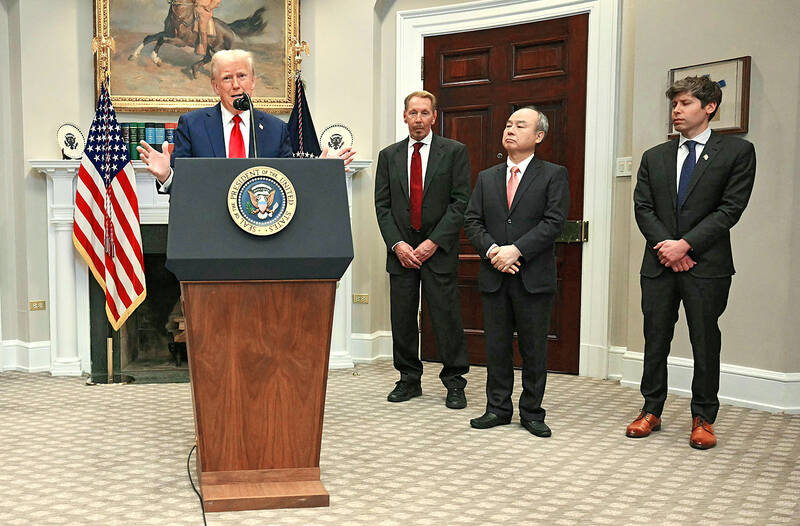US President Donald Trump on Tuesday announced a major investment to build infrastructure for artificial intelligence (AI) led by Japan’s Softbank Group Corp, cloud giant Oracle Corp and ChatGPT-maker OpenAI.
The Stargate AI joint venture “will invest US$500 billion, at least, in AI infrastructure in the United States,” Trump said in remarks at the White House.
“This monumental undertaking is a resounding declaration of confidence in America’s potential,” he said, a day after his swearing-in for a second term.

Photo: AFP
OpenAI chief executive officer Sam Altman, Softbank chief executive officer Masayoshi Son and Oracle founder Larry Ellison attended the announcement.
The companies are committed to investing an initial US$100 billion and up to US$500 billion over the next four years in the project, Son said.
The venture comes as big technology players are scrambling to meet AI’s voracious computing needs, as well as find the electricity necessary to expand the new technology.
Trump said Stargate would be building the physical and virtual infrastructure to power the next generation of advancements in AI, including the construction of “colossal data centers.”
OpenAI later said on social media that the project “will not only support the reindustrialization of the United States but also provide a strategic capability to protect the national security of America and its allies.”
Softbank and OpenAI are the lead partners for Stargate, with Softbank having financial responsibility and OpenAI having operational responsibility, the post said.
MGX, a technology fund from the United Arab Emirates, is a fourth investor, while Arm Holdings PLC, Microsoft Corp, Nvidia Corp, Oracle and OpenAI are the key initial technology partners, it added.
“Build-out is currently underway, starting in Texas, and we are evaluating potential sites across the country for more campuses as we finalize definitive agreements,” OpenAI said.
Softbank shares soared more than 10 percent — leading Tokyo-listed chipmakers higher — after the announcement.
News of the project comes a day after Trump’s inauguration ceremony was attended by prominent technology chiefs, including Apple Inc chief executive officer Tim Cook, Google chief executive officer Sundar Pichai, Meta Platforms Inc chief executive officer Mark Zuckerberg and Amazon.com Inc founder Jeff Bezos.
Trump later on Monday rescinded an executive order from former US president Joe Biden that established oversight measures for companies developing powerful AI models.
Its repeal leaves the US, home to most of the world’s most impactful AI technology, without nationwide AI development guidelines, even if individual states are pursuing their own measures.

SEMICONDUCTORS: The German laser and plasma generator company will expand its local services as its specialized offerings support Taiwan’s semiconductor industries Trumpf SE + Co KG, a global leader in supplying laser technology and plasma generators used in chip production, is expanding its investments in Taiwan in an effort to deeply integrate into the global semiconductor supply chain in the pursuit of growth. The company, headquartered in Ditzingen, Germany, has invested significantly in a newly inaugurated regional technical center for plasma generators in Taoyuan, its latest expansion in Taiwan after being engaged in various industries for more than 25 years. The center, the first of its kind Trumpf built outside Germany, aims to serve customers from Taiwan, Japan, Southeast Asia and South Korea,

Gasoline and diesel prices at domestic fuel stations are to fall NT$0.2 per liter this week, down for a second consecutive week, CPC Corp, Taiwan (台灣中油) and Formosa Petrochemical Corp (台塑石化) announced yesterday. Effective today, gasoline prices at CPC and Formosa stations are to drop to NT$26.4, NT$27.9 and NT$29.9 per liter for 92, 95 and 98-octane unleaded gasoline respectively, the companies said in separate statements. The price of premium diesel is to fall to NT$24.8 per liter at CPC stations and NT$24.6 at Formosa pumps, they said. The price adjustments came even as international crude oil prices rose last week, as traders

Taiwan Semiconductor Manufacturing Co (TSMC, 台積電), which supplies advanced chips to Nvidia Corp and Apple Inc, yesterday reported NT$1.046 trillion (US$33.1 billion) in revenue for last quarter, driven by constantly strong demand for artificial intelligence (AI) chips, falling in the upper end of its forecast. Based on TSMC’s financial guidance, revenue would expand about 22 percent sequentially to the range from US$32.2 billion to US$33.4 billion during the final quarter of 2024, it told investors in October last year. Last year in total, revenue jumped 31.61 percent to NT$3.81 trillion, compared with NT$2.89 trillion generated in the year before, according to

PRECEDENTED TIMES: In news that surely does not shock, AI and tech exports drove a banner for exports last year as Taiwan’s economic growth experienced a flood tide Taiwan’s exports delivered a blockbuster finish to last year with last month’s shipments rising at the second-highest pace on record as demand for artificial intelligence (AI) hardware and advanced computing remained strong, the Ministry of Finance said yesterday. Exports surged 43.4 percent from a year earlier to US$62.48 billion last month, extending growth to 26 consecutive months. Imports climbed 14.9 percent to US$43.04 billion, the second-highest monthly level historically, resulting in a trade surplus of US$19.43 billion — more than double that of the year before. Department of Statistics Director-General Beatrice Tsai (蔡美娜) described the performance as “surprisingly outstanding,” forecasting export growth